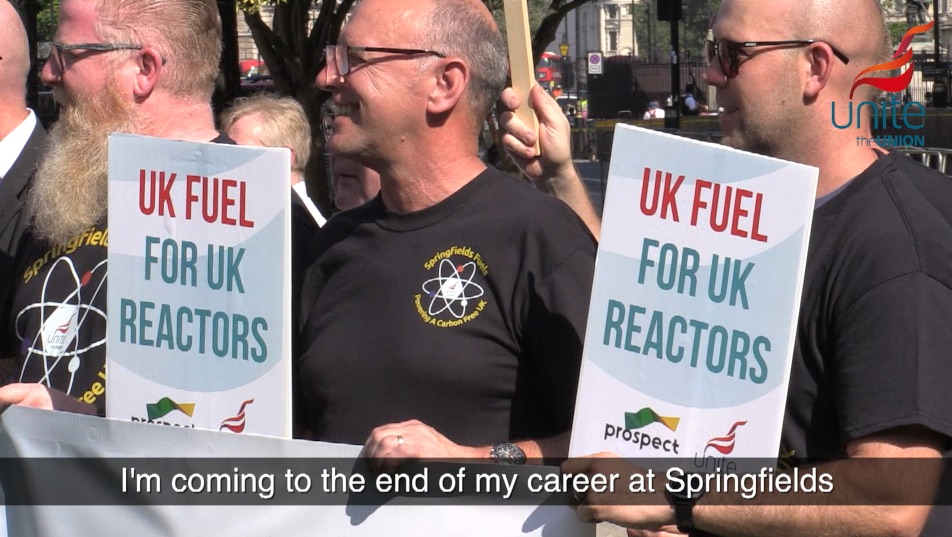‘Who’s going to keep the lights on?’
As UniteLive reported today (December 1), the government’s decision to axe public health spending has created a false economy - short-term savings now will mean ballooning expenditures in the long run for the NHS.
But it isn’t only in the arena of public health that chancellor George Osborne is blinded by short-term thinking in his singleminded quest to achieve a budget surplus by 2020.
Not mentioned in his autumn statement nor highlighted in Treasury documents, the government quietly scrapped its ÂŁ1bn competition for carbon capture and storage (CCS) technology last week.
The move came just six months before the funds for the competition, four years in the making, were slated to be awarded.
As UniteLive noted in September, after power giant Drax pulled out of the White Rose CCS project at its coal-fired power station in North Yorkshire, the green technology that had the potential to transform UK energy was seriously threatened.
Carbon capture and storage is a technology whereby harmful carbon emissions generated by, for example, coal plants, are reduced to virtually zero. This is done by capturing waste carbon dioxide and storing it underground.
This process enables a “dirty” source of energy — such as coal, which plentiful in the UK — to continue powering the country indefinitely without damaging the environment.
But now, after the £1bn competition has been cancelled as part of Osborne’s slew of public spending cuts, the future of CCS is beyond bleak.
Clear pledge reversed
The move is also yet another reversal of a clear pledge in the Tory manifesto, which stated, “We will protect our planet for our children…committing £1bn for carbon capture and storage.”
One of the contestants in the competition was a consortia led by Royal Dutch Shell which was soon planning to submit proposals to install CCS at a Scottish gas power station.
Shell criticised the government’s decision.
“We have worked tirelessly over the last two years to progress our plans for this project,” Shell noted. “It has the potential to bring huge value to the UK, both in terms of immediate emissions reductions and developing knowledge for the benefit of a wider industry.”
Chief executive of the Carbon Capture and Storage Association Dr Luke Warren likewise lambasted the government’s move to cut the £1bn in funding, calling the news “devastating”.
“Only six months ago the government’s manifesto committed £1 billion of funding for CCS,” he said. “Moving the goal posts just at the time when a four year competition is about to conclude is an appalling way to do business.”
“This announcement is a real blow to confidence for companies investing in CCS,” Warren added. “We call on the Government to come forward – as a matter of urgency – with their plans for CCS as this technology is critical for the UK’s economic, industrial and climate policies. Without concrete government support for CCS the UK will lose the opportunity for cost-effective decarbonisation.”
‘Death knell’
Unite researcher Colin Potter also condemned the government’s decision to cut funding, saying that the move all but “sounds the death knell” for CCS, which he said will have serious consequences for the security of the UK’s energy supply.
“There just aren’t viable alternatives at the moment — renewables such solar and wind power have their own problems,” Potter explained. “Germany is a leader in solar power, but at the time of the most recent eclipse, the German government was forced to stop power to, for example, aluminium smelting plants, and had to draw from other energy sources such as nuclear.”
Potter also pointed to the fact that there is no new power to fill the gap as nuclear power stations close, with no replacement plants for at least another 20 years.
“Who’s going to keep the lights on?” Potter noted. “This puts us in a very perilous position and makes us dependent on imported energy.”
Potter added that the repercussions of the government’s decision withdraw its support for CCS go far beyond energy from coal. This is because when a CCS facility is built, other carbon dioxide emitting industries can tap into the same pipeline.
“There are many other CO2 waste producing industries, such as concrete and chemicals, which were relying on the development of a CCS facility so they could tap into that same pipeline,” he said. “Now, these industries too are in grave danger because they’ll either have to shut down or pay the government through the nose in carbon taxes. Either way, a great number of jobs could be put at risk.”
The government’s decision to axe £1bn in support of CCS will also threaten the future of carbon capture and utilisation (CCU), Potter noted. CCU enables carbon waste to be captured and recycled by being put to use in the production of plastics or for aviation or shipping oil, among other products.
“CCU is the next big thing and has enormous potential to play a part in a sustainable energy policy,” he explained. “That’s because while we do have solar powered cars, you can’t power a major aircraft with solar or wind. In this sense, CCU is the way forward. But if you kill off CCS in the UK, you’ll be effectively killing off CCU, too.”
“This latest decision from the government makes little sense and is incredibly short-sighted,” Potter noted. “The government must act soon to support the development of this fundamental technology, because the longer we wait, the more the costs of CCS will skyrocket. At that point, it will simply be too late.”
 Like
Like Follow
Follow


